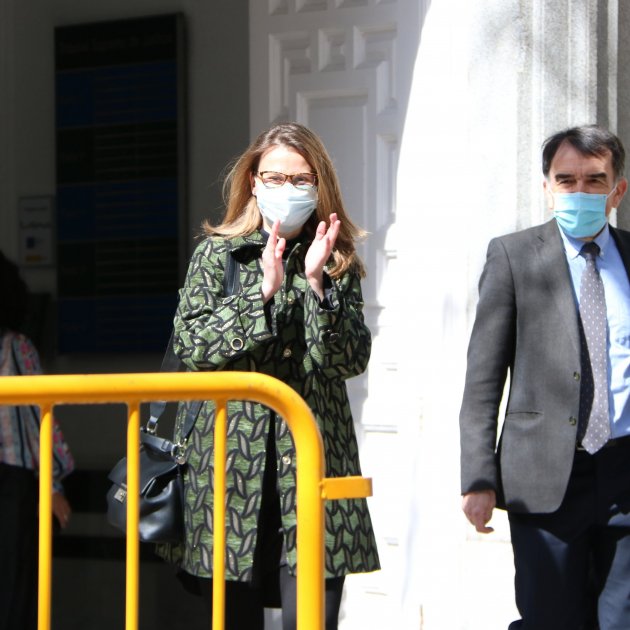After nearly three and a half years in exile, former Catalan government minister Meritxell Serret has decided to return from Brussels to Catalonia - and to Catalan politics, from within Catalonia. This morning she voluntarily presented herself at the Supreme Court in Madrid. Judge Pablo Llarena, the investigating magistrate in the Catalan pro-independence leaders case, summoned her to appear before the court on April 8th and released her without precautionary measures. "The desire has always been to return, and now as an elected deputy, we thought it was time," explained Serret after leaving the court, promising to fight the repression and to work for a political solution to the Catalan conflict. She was greeted with applause.
Following Serret's arrival at the Supreme Court, judge Llarena agreed to her provisional release and revoked the search and arrest order for her. As well, he called her to testify on April 8th at 11am, also citing the public prosecutors and the other parties involved in the case. The only obligation imposed on her is to designate an address so that she can be located and appear before the court when required. The investigating magistrate warns that failure to comply with these conditions would lead to a change in her personal situation.
"A special day"
Upon leaving the Supreme Court, Meritxell Serret declared that it was a "special day" and that she was "well and happy" to be able to return to Catalonia. Now she is only thinking of completing "the 406 kilometres to my village and my family." Now she will accept the position of deputy in the Catalan Parlament, which is constituted tomorrow. She explained that "very few people" knew of her return from exile. Sources in her party, ERC, have since revealed that she entered Spanish territory via the Basque Country, crossing the border by car from France during the night in what was considered an operation of "high risk". She was accompanied on her journey from Belgium.
Serret appeared outside the court supported by representatives of the pro-independence parties / Nicolas Tomás
"I am here because I am keeping my commitment. I want to be an MP and work politically to continue advancing for a democratic resolution of the conflict and an end to the repression of the independence movement," said the former agriculture minister under Carles Puigdemont's government. Having been included on the ERC party list in its candidature for last month's elections, she has a seat in parliament waiting for her, if able to take it up. Thus, with this additional motive, she decided it was time to take the step of returning.
Catalan and Basque support outside the court
She was accompanied by representatives of all Catalan and Basque pro-independence political forces. The leader of ERC in Madrid, Gabriel Rufián, expressed his pride in the "courage" of Serret, the first exile to return. Rufián hoped that she would not be the last to make her way back to Catalonia.
Serret left Catalonia with other members of the Catalan government at the end of October 2017 in order to continue the struggle from exile, given the apparent inevitability at that time - subsequently confirmed by events - of repression of the independence movement by the Spanish state. Later she served in Brussels as EU representative for the Catalan government. Along with her fellow exiles, she was sought by Spanish justice and the subject of a European Arrest Warrant, later withdrawn.
In Serret's case, the two offences for which she is under investigation in Spain are misuse of public funds and disobedience. The court argues that as no specific expense has been attributed to the organization of the referendum in the department she led, and taking into account that the other ministers in the same situation - Carles Mundó, Meritxell Borràs and Santi Vila - were all acquitted of misuse of funds - which could lead to prison sentences - she was not held in custody.
Main image: Meritxell Serret as she left the Supreme Court in Madrid / ACN
